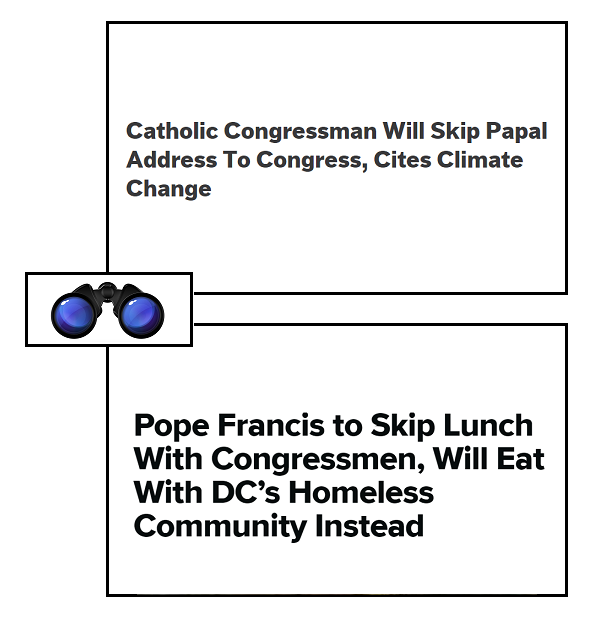Papal skipping
[ by Charles Cameron — politics and the pope — but you could go straight to Thomas Merton on contemplation, right at the end, and skip the rest ]
.
After a busy week, I have seven or eight unfinished ZP pieces to polish up and post — here’s the first.
Skipped:
Sources:
Think Progress, Catholic Congressman Will Skip Papal Address To Congress, Cites Climate Change Good magazine, Pope Francis to Skip Lunch With Congressmen, Will Eat With DC’s Homeless Community Instead **
Also skipped:
Alito, Breyer, Kagan, Scalia, and Thomas skip papal address to Congress
Notably absent were Antonin Scalia, Clarence Thomas and Samuel Alito, all of whom are Catholic. Also absent were Stephen Breyer and Elena Kagan, who are Jewish.
**
NPR saw fit to post The 10 Most Political Moments In Pope Francis’ Address To Congress:
Embracing John Kerry A call to rise above polarization A call for the country to open its arms to immigrants and refugees A reminder on abortion Strongly advocating for abolishing the death penalty Poverty and the necessity of ‘distribution of wealth’ Business should be about ‘service to the common good’ Calling on Congress to act on climate change Antiwar message and a call to stop arms trade importance of family and marriage Note also, from WaPo.. “The Jesuits refer to him as a mixture of a desert saint and Machiavelli.”
**
As for myself, I particularly liked #2, the “call to rise above polarization”:
Francis warned against the “temptation” of “the simplistic reductionism which sees only good or evil; or, if you will, the righteous and sinners. The contemporary world, with its open wounds which affect so many of our brothers and sisters, demands that we confront every form of polarization which would divide it into these two camps.” .. He also noted one his heroes, American Thomas Merton, whom Francis said had “the capacity for dialogue and openness to God.”
It is hard to say which party Pope Francis would chose under the rubric “Whoever is not with me is against me” now popular in Congress.
**
And what, finally, of Thomas Merton himself? Who is this Trappist monk the Pope mentions?
I had the good fortune to correspond briefly with Fr Merton while I was still an undergraduate at Oxford in 1964, more than a half century ago, and he was kind enough to say of my letter “It makes me feel somehow I am in contact with the human race”. His response can be found in Road To Joy: The Letters Of Thomas Merton To New And Old Friends.
Here’s the voice of Thomas Merton, speaking of the central practice of his life — central, too, I would suggest, to the politics of this Pope:




September 26th, 2015 at 10:59 pm
On the one hand it looks as though Pope Leo’s century-old warning about American Catholics replacing Catholicism with Americanism is still fresh. On the other it would be nice if Francis devoted a tiny bit of attention to the actual reasons for the many migrants (whether refugees, economic migrants, or just plain rent-seekers) trying to make their way to Germany and Northern Europe: dysfunctional (or even malfunctional) social, economic, and political systems.
September 27th, 2015 at 9:17 pm
Francis was channeling Justice Kennedy, the judicial father of enhanced marriage rights
http://joshblackman.com/blog/2015/09/27/pope-francis-and-justice-kenendy-on-transcendent-dimensions/
September 28th, 2015 at 9:22 pm
Hi Charles,
Thanks for continuing to offer thought-provoking articles. I did not know who Thomas Merton was, and after listing to the video, I did not really understand what he was talking about until he finished with the “I am” statement, which is what my own religious theory is based upon.
Earlier today I read an article on the SSIR web site about design thinking and understanding the root causes of poverty. http://ssir.org/articles/entry/using_design_thinking_to_eradicate_poverty_creation It quotes Einstein in saying “Ask the right question.”
I am a huge fan of the Pope’s but feel he would have a lot more credibility if he supported some root cause analysis that showed the role (or lack of role) of organized religion, and the Catholic Church, in enabling poverty and supporting the rich and powerful.
I think in the past you may have written some articles focused on root-cause analysis. I’ll look forward to reading more.
Dan
September 29th, 2015 at 8:30 pm
Daniel, I can tell you that I think the UN Sustainable Development Goals are indeed suspect (probably for different reasons), but in that article he’s not really talking about design thinking but system thinking.
For system thinking, certainly getting to the heart of the matter is important, but a problem with this process is one side trots out their statistics, then other side a competing set of statistics, then one side appeals to tradition, the other side to emotion, one side is sure it will require a hammer, the other convinced it takes a village, etc, etc… until you don’t even get past the starting gate.
Design thinking, on the other hand, narrows the focus, perhaps in implicit acknowledgement of the uncertainty of complex problems.
Design thinking gets on the ground, tries to determine who the people are that are being affected, and attempts to see the world through their eyes: https://en.wikipedia.org/wiki/Persona_%28user_experience%29
After that a user journey is mapped out which I suppose is analogous to a causal loop diagram. Testing and user feedback allow for revising and honing the solution in a bottom-up approach, user-centric approach.
This is an empathetic approach, and I would suggest that, while the culture he comes from has a mixed record recently, Francis’ empathy would still give him a lot of credibility in this process.
If he were to choose this process, that is. Judging by his encyclical he seems to favor the grand, top-down methods.